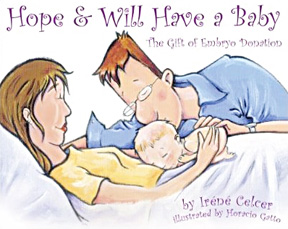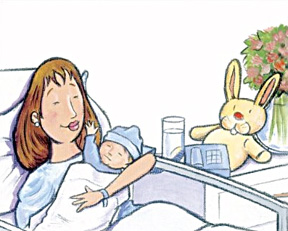Hope & Will Have a Baby – Book review by Craig R. Sweet, M.D.
 This book is one of a collection of third party conception children’s books written by the same author and illustrator and published by Graphite Press, copyright of 2006. It is one of the only books I have seen for children conceived though embryo donation.
This book is one of a collection of third party conception children’s books written by the same author and illustrator and published by Graphite Press, copyright of 2006. It is one of the only books I have seen for children conceived though embryo donation.
Ms. Celcer is a mental health professional that feels it is important to be up front in telling the children of embryo donation about their origin. In her forward, she cites the past secrets in adoption causing harm. She goes on suggesting that-
- • Children somehow sense the secrets
- • The failure to divulge may create shame in the parents of donated embryo offspring
- • Failure to tell a child results in a loss of pride of their beginnings
This book is to be used to tell the children about their loving conception while trying to manage the complex emotions of the parents.
Through the eyes of Hope and Will, a young married couple in love, the book explains what a “special place” the uterus is and how  embryos are created. Hope and Will experience infertility, depression and probably some grumpiness (can you imagine?). They seek help through Dr. Quest, who gives Hope tablets, pills and shots, but to no avail. Embryo donation is discussed, explaining anonymous and open options in simple and easy to understand terms.
embryos are created. Hope and Will experience infertility, depression and probably some grumpiness (can you imagine?). They seek help through Dr. Quest, who gives Hope tablets, pills and shots, but to no avail. Embryo donation is discussed, explaining anonymous and open options in simple and easy to understand terms.
Hope and Will conceive though embryo donation. The author emphasizes love, pride and excitement when the delivery finally takes place. Hope and Will are clearly grateful to their donor couple whom they have never met. Enough information is provided about the donors to help the child understand his origin.
While perhaps a little complex for a young child of four or five, the book might work quite well for a slightly older child. The pictures are wonderful and the emphasis on love and the desire to have a child by whatever means necessary is well done. I have always suggested that if parents tell the child, they should highlight their tremendous desire to have and love that child, as well as how hard they worked to bring such a wonderful child into their home.
Disclosure in embryo donation is a periodic theme of a number of my blogs. Adoption is clearly different than embryo donation. Adoption tends to be well accepted by most of the world’s religions. If embryo recipients tell friends, family and their donor-conceived offspring, there may be significant repercussions. Will the recipients and offspring be criticized, ostracized or, even, excommunicated by these same people or by their own religion?
Unfortunately at this time, I simply don’t believe we have enough data to make a clear recommendation to embryo recipients although there is wonderful ongoing research that will hopefully help to answer this question. For now, extrapolating what we have learned from adoption may simply not be appropriate for embryo donation, although passions on both sides of this issue  abound. The long-term consequences of secrecy vs. total openness to friends, family and the child of embryo donation are essentially unknown and I feel this decision needs to be made carefully with consultation with skilled mental health professionals (and Ms. Celcer is one of them), reproductive endocrinologists and perhaps, most importantly, recipients that have already traveled this journey.
abound. The long-term consequences of secrecy vs. total openness to friends, family and the child of embryo donation are essentially unknown and I feel this decision needs to be made carefully with consultation with skilled mental health professionals (and Ms. Celcer is one of them), reproductive endocrinologists and perhaps, most importantly, recipients that have already traveled this journey.
Selling for about $20 at Barnes & Noble, the purchaser should know this is a paperback and only 28 pages. The reader is clearly paying for the content and not story length or volume.
I highly recommend this book for those parents who decide to tell their child they were conceived through embryo donation, although the story line may need to be changed for single women and gay and lesbian couples. For the lucky parent(s) of embryo donation, this is a fairly good place to start if disclosure is the path they choose to follow.
Craig R. Sweet, M.D.
Founder, Medical & Practice Director
Embryo Donation International
As a single woman, finding a donated embryo can be much more difficult than for a two parent family and I wonder if a single parent plays any role in the ranking?
Great question! Please understand that it is the donor that drives this entire process. They are able to provide stipulations regarding the recipients. The most common stipulations are:
• Geographic location (they don’t want recipients that are located nearby)
• Marital/Partner Status
• Sexual Preference
• Race
• Religion
The reality is that few embryo donors currently allow for single women to receive their embryos. As a result, we have a longer waiting list for single women than for couples.
When we have embryos destined for single women, we then examine that particular waiting list. We use the same criteria to rank the single women with regards to priority as we have listed in the blog above. This process is true for all of the stipulations.
Excellent question. We should have explained it in the body of the blog, so I thank you for giving me a chance to clarify.
Craig R. Sweet, M.D
Reproductive Endocrinologist
Embryo Donation International